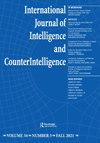阴影与光明:亚洲人的智慧
IF 0.5
Q4 INTERNATIONAL RELATIONS
International Journal of Intelligence and Counterintelligence
Pub Date : 2023-09-11
DOI:10.1080/08850607.2023.2247831
引用次数: 0
摘要
点击增大图片尺寸点击缩小图片尺寸附加信息撰稿人备注玛丽安·塔夫林格玛丽安·塔夫林格是海军研究生院国土防御与安全中心的研究员。她在米德尔伯里国际研究学院获得公共管理硕士学位,并在多家期刊上发表过文章。联系作者:mtafling@nps.edu.Notes1 Stuart Hall,《文化研究1983:理论史》,由Jennifer Daryl Slack和Lawrence Grossberg编辑(Durham, NC: Duke University Press, 2016),第33页,引用自Shaffer The Handbook of Asian Intelligence Cultures,第xi - 2页Irena Chiru,“国家情报文化”,在民主国家的情报行为:过程,实践,由Florina Christiana Matei和Carolyn Halladay编辑(博尔德,CO: Lynne Rienner, 2019),第214-215.3 Shuja Nawaz,谁控制巴基斯坦的安全部队?Bidanda M. Chengappa,“ISI在巴基斯坦政治中的作用”,《战略分析》,第23卷,第11期(2000年)。本文章由计算机程序翻译,如有差异,请以英文原文为准。
Shadows and Light: Asian Intelligence
Click to increase image sizeClick to decrease image size Additional informationNotes on contributorsMarianne TaflingerMarianne Taflinger is a Research Associate at the Center for Homeland Defense and Security, Naval Postgraduate School. She earned a master’s degree in public administration from the Middlebury Institute of International Studies and has published in several journals. The author can be contacted at mtafling@nps.edu.Notes1 Stuart Hall, Cultural Studies 1983: A Theoretical History, edited by Jennifer Daryl Slack and Lawrence Grossberg (Durham, NC: Duke University Press, 2016), p. 33, as quoted in Shaffer The Handbook of Asian Intelligence Cultures, p. xvi.2 Irena Chiru, “National Intelligence Cultures,” in The Conduct of Intelligence in Democracies: Processes, Practices, edited by Florina Christiana Matei and Carolyn Halladay (Boulder, CO: Lynne Rienner, 2019), pp. 214–215.3 Shuja Nawaz, Who Controls Pakistan’s Security Forces?, Special Report 297 (Washington, DC: U.S. Institute of Peace, December 2011), p. 4.4 Bidanda M. Chengappa, “The ISI Role in Pakistan’s Politics,” Strategic Analysis, Vol. 23, No. 11 (2000).
求助全文
通过发布文献求助,成功后即可免费获取论文全文。
去求助
来源期刊

International Journal of Intelligence and Counterintelligence
INTERNATIONAL RELATIONS-
CiteScore
1.00
自引率
22.20%
发文量
102
 求助内容:
求助内容: 应助结果提醒方式:
应助结果提醒方式:


